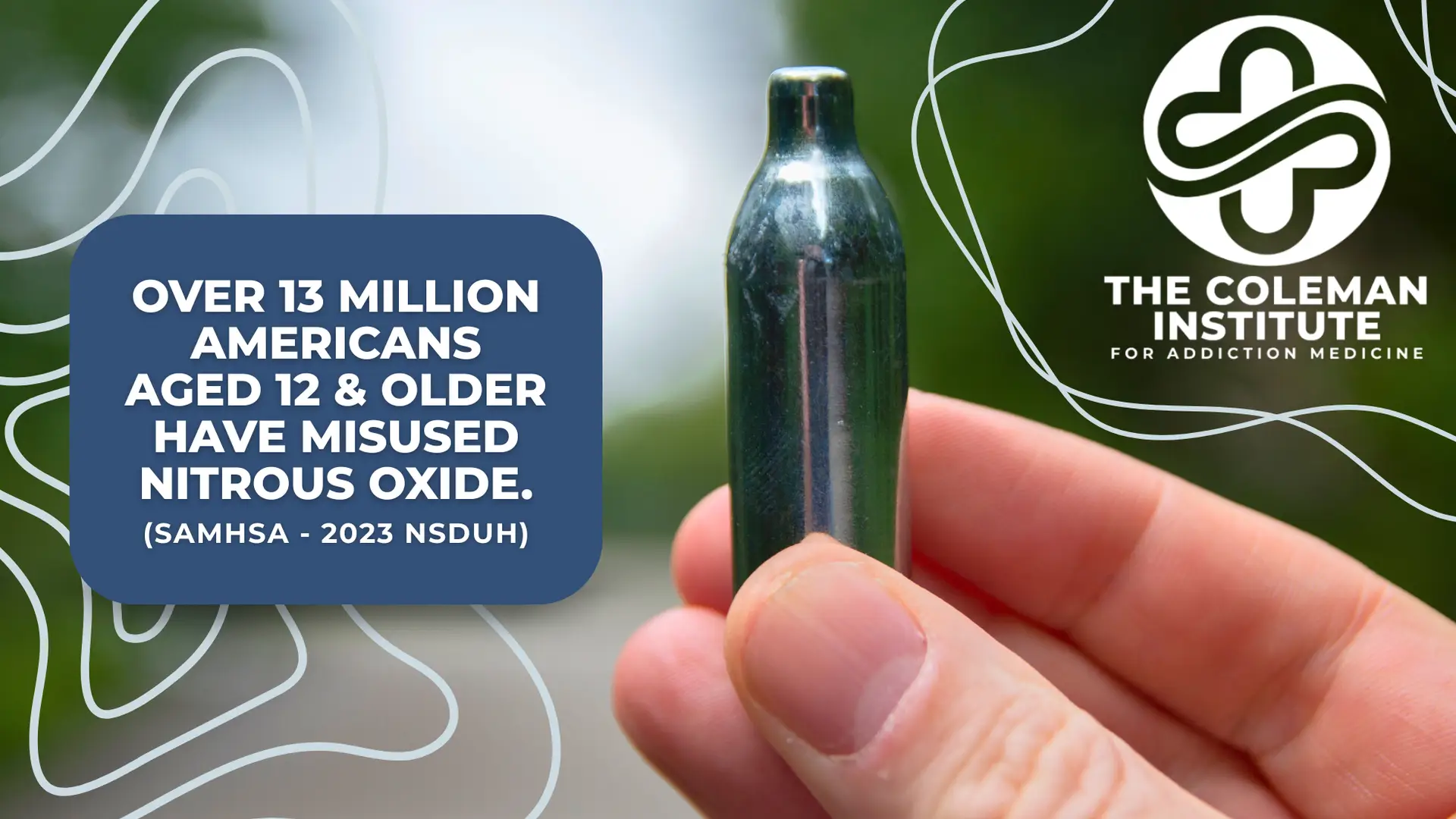Nitrous oxide, commonly referred to as whippets, NOS, or Galaxy Gas, has become an increasingly misused substance, particularly among younger individuals. A now common party drug, repeated use can quickly spiral into dependence, brain damage, and emotional instability.
At The Coleman Institute, we understand the dangers of nitrous oxide and have seen it firsthand. Although not classified as an opioid, nitrous oxide activates the opioid system and primarily exerts its effects through non-competitive antagonism of NMDA receptors. It being somewhat similar to opioids opens the door to an innovative detox solution, our Accelerated Outpatient Opioid Detox program.
Let's break down what nitrous oxide is, why it's addictive, and how our outpatient detox treatment can provide a safe, comfortable, convenient, and effective path to recovery.
What Is Nitrous Oxide?
Nitrous oxide is a dissociative anesthetic with both medical and recreational use. In hospitals, it's administered as 'laughing gas' for pain relief and sedation. Recreationally, it's inhaled through balloons, dispensers, or tanks, producing a short-lived sense of euphoria, dizziness, giddiness, and even auditory and visual distortions.Common street names of nitrous oxide include:
- Whippets
- NOS
- N2O
- Laughing Gas
- Galaxy Gas
- Hippie Crack
- Canisters/Chargers
But its legality has fueled a widespread misconception, leading many to believe it's harmless. Nitrous oxide is not safe when used recreationally, frequently, or in high doses.

Why Nitrous Oxide Can Become Addictive
Unlike substances such as heroin or fentanyl, nitrous oxide isn't physically addictive in the classic opioid sense. However, many people find themselves using it compulsively, unable to stop even as their health deteriorates. Let’s explore why that is.Activation of Opioid Receptors
Nitrous oxide involves the opioid receptor system, primarily through the release of endogenous opioids. These receptors are tied to pain relief, reward, and euphoria, making them foundational to the development of addiction. Although NOS does not cause typical opioid withdrawal, repeated stimulation of these receptors may create a feedback loop of emotional cravings, dysphoria, and compulsive use.Psychological & Neurological Dependency
Nitrous oxide misuse can lead to:- Brain fog & dissociation
- Depression & anxiety
- Irritability or apathy
- Peripheral neuropathy
- Symptoms include numbness, tingling, & nerve damage
- Vitamin B12 depletion
- This can lead to irreversible brain & spinal cord damage
How Our Accelerated Detox Protocol Can Help
The Coleman Institute specializes in outpatient, comfort-focused detoxification for opioid use. Given nitrous oxide's effect on the opioid system, our protocol can be helpful for individuals dependent on NOS and other substances.Are you wondering what to expect at The Coleman Institute's detox program for nitrous oxide?
Comprehensive Medical Evaluation
Not all NOS users are alike. Some use occasionally; others inhale countless canisters a day.Our clinical team starts with a full assessment of:
- Your nitrous oxide use history
- Physical & psychological symptoms
- Any co-occurring substance use
- Mental & physical health concerns
Non-Addictive Comfort Medications
During detox at The Coleman Institute, patients are supported with:- Expert treatment to help with withdrawal & cravings
- Medications that help reduce anxiety & mood swings
- Supplements to support neurological healing
- Close clinical monitoring to ensure safety & comfort
Outpatient Flexibility
Unlike inpatient rehab, our detox is done on an outpatient basis. That means no hospitalization, just daily visits to our facility. Our detoxes are completed in only a few days, with a 95% completion rate.Naltrexone Therapy for Long-Term Sobriety
Because NOS affects the mu opioid system, patients may benefit from Naltrexone Therapy.Naltrexone is a non-addictive medication that:
- Blocks the euphoric effects of opioids
- Reduces withdrawals & cravings
- Can be administered as a monthly injection (Vivitrol)
What Recovery Looks Like After Detoxing
At The Coleman Institute, we believe that detox is just the beginning; recovery is a journey, not a destination. That's why we work with you and your support network to create a continuing care plan tailored to your sobriety goals.Our case management connects you with:
- Therapy for trauma, anxiety, or depression
- Neurological rehabilitation for cognitive symptoms
- Recovery coaching or support groups


